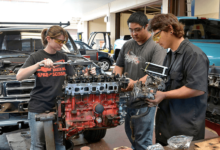In the same way, people need regular checkups with their doctors, cars require routine trips to the mechanic even if it’s just yearly. It can be dangerous if you wait until there is a problem taking your vehicle to a mechanic. Regular maintenance can take care of many possible issues before they cost a lot of money.
Most car experts advise that vehicles have a simple tune-up every 36,000 miles or around every two years. You might have a service warranty that covers routine maintenance if your car was new when you bought it from a dealer. Let’s look at some car parts that need inspection during a tune-up.
Oil and oil filter
You might as well have a professional oil change while your car is in the garage for an engine tune-up. It’s not a terrible idea to have an expert mechanic examine the oil pan and surrounding components if you typically perform this work yourself. An oil change price may vary from shop to shop, but it is worth it in the long run.
Fluids
Your car’s performance and lifetime depend on the power steering, brake, transmission, antifreeze, and power steering fluids. The mechanic will check the levels of each of these fluids during a tune-up and top them off as necessary. The mechanic will also examine the condition of your radiator and the amount of coolant.
Air filter
The mechanic will check for an old or clogged air filter and replace it if necessary. Remember that it is best to replace air filters every time you change your oil. Because of a shortage of oxygen, a bad air filter can lower your vehicle’s fuel efficiency and cause your engine to stall.
Battery
Even though newer car batteries can endure about ten years with minimum care, routine tune-ups still need to include a thorough evaluation of the battery and its surroundings. A mechanic will examine the battery’s health and lifespan and clean away any battery acid accumulated near the hardware.
Wheel bearings and alignments
The mechanic will check the axles and undercarriage of your automobile during a tune-up for any potential issues. They will also examine the wheel bearings and align them if necessary. Your ride will be smoother hence less wear and tear. Your mechanic might also rotate, balance, and replace tires with worn-out treads.
Belts and hoses
During a tune-up, a qualified mechanic will check all of your car’s belts and hoses. He will ensure that all belts are in good shape and that the clamps holding the radiator hoses are solid. Any belts that exhibit splitting or cracking should be replaced immediately to prevent a snap.
You probably have a faulty belt if you’ve heard a loud whining sound coming from your engine when it’s running. Let your mechanic know to identify which of the numerous belts in your car are faulty and replace them.
Lights
A tune-up includes examining all your car’s lights, including the headlights, brake lights, tail lights, and blinkers. A replacement is necessary if needed.


